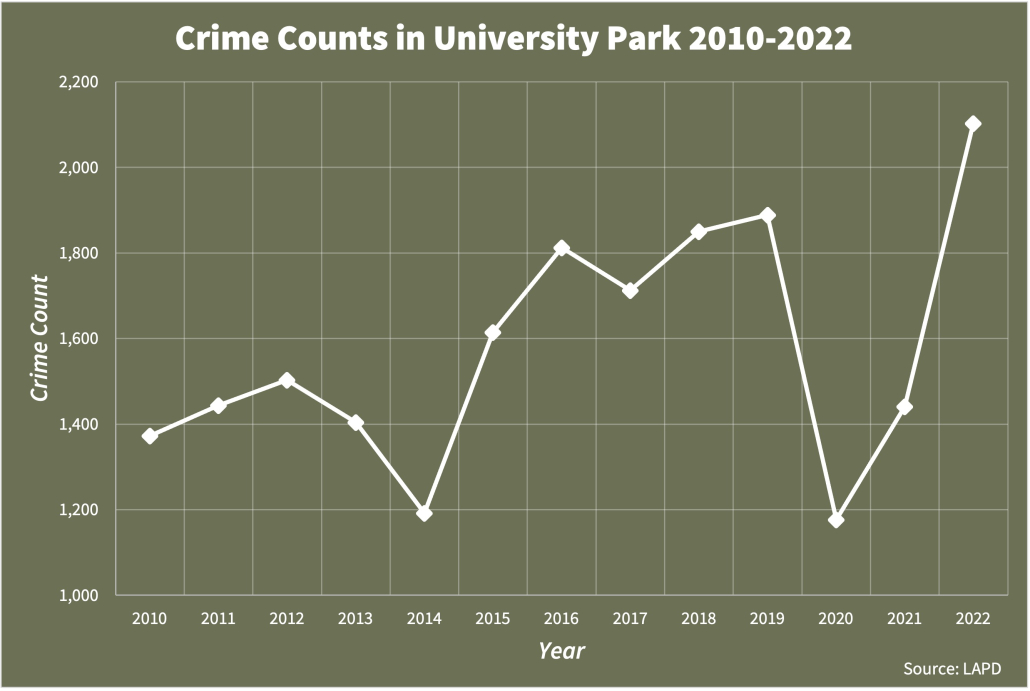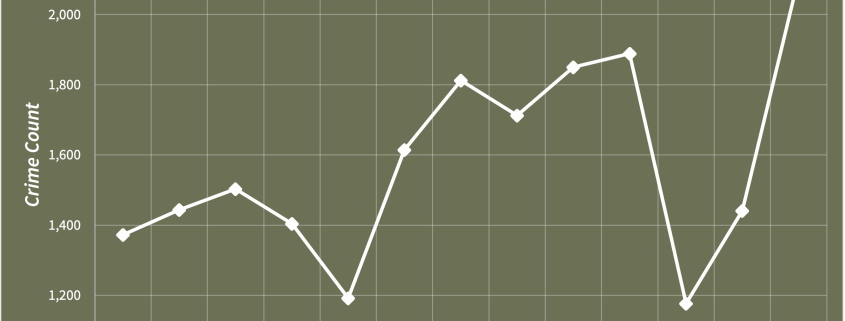Crime in University Park hit decade-long high in October

October 2022 saw a decade-high peak in crimes committed in the University Park neighborhood, an area of Los Angeles that includes USC’s University Park Campus.
Data from the Los Angeles Police Department reported 236 crimes in the month of October, a number higher than any recorded month since January 2010. This amounts to an average of seven crime reports a day. The second highest count was recorded the following month — 221 in November.
In addition to the October high, 2022 as a whole saw an increase in reported crimes, with 1,914 crimes reported in University Park alone for the entire year. Crosstown LA’s University Park newsletter documented a 36% increase in crime reports from 2021 to 2022 by the LAPD, though they acknowledged that some of the most violent offenses, such as aggravated assault and murder, began to slow at the end of the year.
Gabriel Kahn, professor of professional practice of journalism and the founder of Crosstown — a non-profit, data-focused news organization — wrote in a Crosstown L.A. newsletter that “crime means many things … from aggravated assault to misdemeanor vandalism. There is also a lot that the LAPD data doesn’t capture, such as wage theft and most white-collar crimes.”
Some types of crime have spiked while others have fallen slightly. For example, homicides fell in 2022, but they remain above pre-pandemic levels. Meanwhile, armed robberies jumped by more than 30%.
The neighborhoods surrounding University Park also saw an increase in crime over the past year, but not by quite as much. The number of reported crimes in Adams/Normandie went up by 12%, those in Exposition Park were up by 15% and those in Historic South Central up by 26%.
In interviews with the Daily Trojan, some students said safety issues in USC’s surrounding area are not a big concern for them — despite the rising number of crimes reported in the University Park neighborhood.
“If it’s within one block, two blocks [of USC], I feel like it’s fine because we have a lot of patrol people go around the campus,” said Kevin Ou, a sophomore majoring in computer engineering and computer science.
“[USC is] worried about people engaging in unsafe behavior and having to walk back home, [but they are] forcing people to either separate or wait for a long period of time. I don’t see how that’s helpful.”
Memphis Johnston, freshman majoring in public relations
University safety ambassadors are contracted by USC to patrol street corners within a two and a half mile range of campus. This program has been in place since 2009, an addition to the Department of Public Safety’s patrols to ensure students’ safety in the surrounding area.
Another program to ensure public safety is the blue light emergency phone system, which has locations across campus and surrounding areas that students can use to call for an escort, report crimes or report suspicious activities directly to DPS. If the caller is unable to talk, DPS can identify the location of the phone.
Although USC offers several programs to ensure public safety, a few students said the change in the USC-Lyft partnership program — students must now select the shared ride option to be financially covered by USC — is not considerate of students’ safety.
“[USC is] worried about people engaging in unsafe behavior and having to walk back home, [but they are] forcing people to either separate or wait for a long period of time,” said Memphis Johnston, a freshman majoring in public relations. “I don’t see how that’s helpful.”
Dweepa Honnavalli, a second-year graduate student studying computer science, expressed misgivings about the safety of the University Park neighborhood and said it was challenging to adjust to as an international student.
“I actually recently had to call the cops because an unknown man and I were arguing and he refused to leave,” Honnavalli said. “Everyone is safe, but it’s still kind of scary, especially if you’re not from the country … to come and see a crime in like a week; It’s kind of hard.”
Honnavalli echoed the worries that other students have about the Lyft program and said the change makes her feel even more unsafe.
“It’s hard to even get a Lyft and it takes longer for you to get home at night,” Honnavalli said. “All of that adds to how unsafe people feel around. [USC] should first bring back the individual rides, and then they should expand the Lyft zone to maybe two or three more miles.”
DPS did not respond to the Daily Trojan’s request for comment in time for publication.

